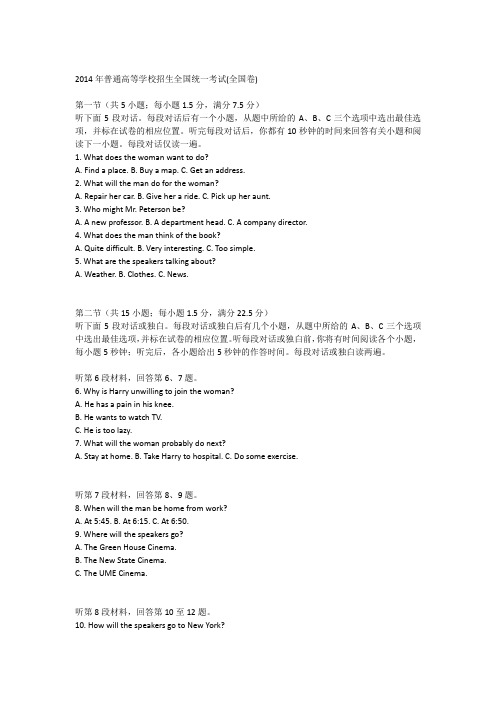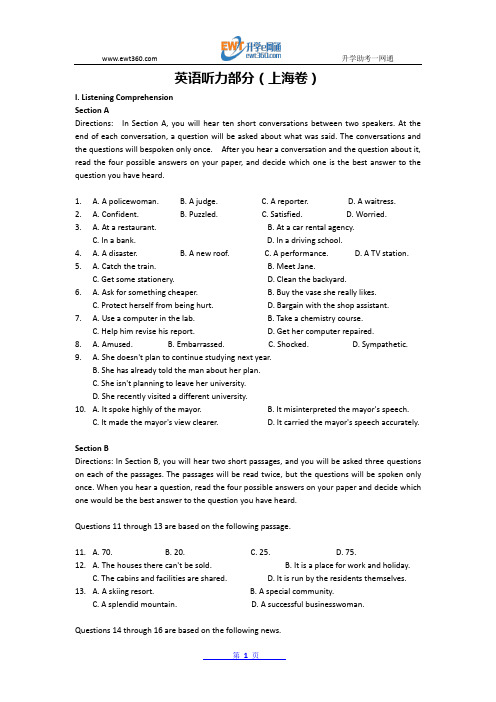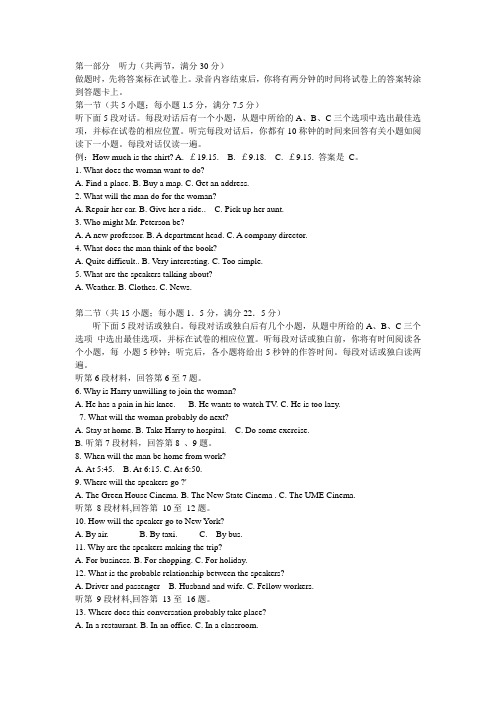2014年全国高考英语听力卷试题、答案 听力原文
2014年高考英语全国1卷听力(录音+原文+答案)

2014年高考英语全国1卷听力(录音+原文+答案)听力下载链接:https:///s/15fBZw6-1yj309FrPWC-lBg提取码:12342014全国卷听力试题第一部分听力(共两节,满分30分)做题时,先将答案标在试卷上。
录音内容结束后,你将有两分钟的时间将试卷上的答案转涂到答题卡上。
第一节(共5小题;每小题1.5分,满分7.5分)听下面5段对话。
每段对话后有一个小题,从题中所给的A、B、C三个选项中选出最佳选项。
听完每段对话后,你都有10秒钟的时间来回答有关小题和阅读下一小题。
每段对话仅读一遍。
例:How much is the shirt?A. £19.15.B. £9.18.C. £9.15.答案是C。
1. What does the woman want to do?A. Find a place.B. Buy a map.C. Get an address.2. What will the man do for the woman?A. Repair her car.B. Give her a ride.C. Pick up her aunt.3. Who might Mr. Peterson be?A. A new professor.B. A department head.C. A company director.4. What does the man think of the book?A. Quite difficult.B. Very interesting.C. Too simple.5. What are the speakers talking about?A. Weather.B. Clothes.C. News.第二节(共15小题,每小题1.5分,满分22.5分)听下面5段对话或独白。
每段对话或独白后有几个小题,从题中所给的A、B、C三个选项中选出最佳选项。
2014年高考英语听力全国卷

2014年普通高等学校招生全国统一考试(全国卷)第一节(共5小题;每小题1.5分,满分7.5分)听下面5段对话。
每段对话后有一个小题,从题中所给的A、B、C三个选项中选出最佳选项,并标在试卷的相应位置。
听完每段对话后,你都有10秒钟的时间来回答有关小题和阅读下一小题。
每段对话仅读一遍。
1. What does the woman want to do?A. Find a place.B. Buy a map.C. Get an address.2. What will the man do for the woman?A. Repair her car.B. Give her a ride.C. Pick up her aunt.3. Who might Mr. Peterson be?A. A new professor.B. A department head.C. A company director.4. What does the man think of the book?A. Quite difficult.B. Very interesting.C. Too simple.5. What are the speakers talking about?A. Weather.B. Clothes.C. News.第二节(共15小题;每小题1.5分,满分22.5分)听下面5段对话或独白。
每段对话或独白后有几个小题,从题中所给的A、B、C三个选项中选出最佳选项,并标在试卷的相应位置。
听每段对话或独白前,你将有时间阅读各个小题,每小题5秒钟;听完后,各小题给出5秒钟的作答时间。
每段对话或独白读两遍。
听第6段材料,回答第6、7题。
6. Why is Harry unwilling to join the woman?A. He has a pain in his knee.B. He wants to watch TV.C. He is too lazy.7. What will the woman probably do next?A. Stay at home.B. Take Harry to hospital.C. Do some exercise.听第7段材料,回答第8、9题。
2014年高考真题英语听力试题、原文及答案(上海卷)

英语听力部分(上海卷)I. Listening ComprehensionSection ADirections: In Section A, you will hear ten short conversations between two speakers. At the end of each conversation, a question will be asked about what was said. The conversations and the questions will bespoken only once. After you hear a conversation and the question about it, read the four possible answers on your paper, and decide which one is the best answer to the question you have heard.1. A. A policewoman. B. A judge. C. A reporter. D. A waitress.2. A. Confident. B. Puzzled. C. Satisfied. D. Worried.3. A. At a restaurant. B. At a car rental agency.C. In a bank.D. In a driving school.4. A. A disaster. B. A new roof. C. A performance. D. A TV station.5. A. Catch the train. B. Meet Jane.C. Get some stationery.D. Clean the backyard.6. A. Ask for something cheaper. B. Buy the vase she really likes.C. Protect herself from being hurt.D. Bargain with the shop assistant.7. A. Use a computer in the lab. B. Take a chemistry course.C. Help him revise his report.D. Get her computer repaired.8. A. Amused. B. Embarrassed. C. Shocked. D. Sympathetic.9. A. She doesn't plan to continue studying next year.B. She has already told the man about her plan.C. She isn't planning to leave her university.D. She recently visited a different university.10. A. It spoke highly of the mayor. B. It misinterpreted the mayor's speech.C. It made the mayor's view clearer.D. It carried the mayor's speech accurately.Section BDirections: In Section B, you will hear two short passages, and you will be asked three questions on each of the passages. The passages will be read twice, but the questions will be spoken only once. When you hear a question, read the four possible answers on your paper and decide which one would be the best answer to the question you have heard.Questions 11 through 13 are based on the following passage.11. A. 70. B. 20. C. 25. D. 75.12. A. The houses there can't be sold. B. It is a place for work and holiday.C. The cabins and facilities are shared.D. It is run by the residents themselves.13. A. A skiing resort. B. A special community.C. A splendid mountain.D. A successful businesswoman.Questions 14 through 16 are based on the following news.14. A. Those who often sent text messages. B. Those who suffered from heart disease.C. Those who did no physical exercise.D. Those who were unmarried.15. A. They responded more slowly than usual. B. They sent more messages.C. They typed 10 percent faster on average.D. They edited more passages.16. A. Why chemical therapy works.B. Why marriage helps fight cancer.C. How unmarried people survive cancer.D. How cancer is detected after marriage.Section CDirections: In Section C, you will hear two longer conversations. The conversations will be read twice. After you hear each conversation, you are required to fill in the numbered blanks with the information you have heard. Write your answers on your answer sheet.Blanks 17 through 20 are based on the following conversation.听力部分答案1. A 2.D 3.B 4.A 5.B6.D7.A8.C9.C 10.B11.C 12.D 13.B 14.C 15.A 16.B17. conference18. daylight19. moving20. overcrowded21. implications and conclusions22. reasoning23. Figures24. keep questioning附:听力原文材料见下一页(图片形式)。
(完整)14年高考英语听说考试真题A录音原文与参考答案

2014年广东省高考英语听说考试真题AOne of the most extraordinary civilizations the world has known disappeared. Millions of people die, some were savagely murdered. Why it happened is a mystery. This is the story of one man's search for the truth. The Maya lived in what is today Southern Mexico and central America.They were deeply spiritual, worshipping dozens of gods of the sun and moon, the earth and wind, fire and, rain.From the jungles and plains rose cities and towns, great centers of worship, of art and learning.The Maya’s achievements were staggering, they developed their own writing, and mastered astronomy and mathematics.三问部分:Question 1:颜色怎样影响我们的购买行为?How do colors affect our buying decisions?How do colors influence our buying decisions?How do colors influence our purchasing behavior? How do colors affect our buying behavior?How do colors influence our buying behavior?How do colors affect our purchasing behavior? Answer 1: People have different feelings about colors and their feelings help them decide what tobuy. For example, blue makes people feelpeaceful, quiet.It doesn’t create strongemotions. So it’s a favorit e for banks andinsurance companies. And for sellingproducts, it’s often used to suggestsomething pure and fresh.Question 2: 什么颜色对顾客更有吸引力?What color is more attractive to customers?/What color can attract customers more?/What color can appeal to more customers?/What color can attract people’s attention more?/What color can draw people’s attention more?Answer 2:Well, you can sell almost anything with a red.It’s a hot color, which suggests a feeling ofenergy and even excitement, it catches yourattention. You often see red on magazinecovers. But if you use it too much, it lookscheap and may make people tired. Question 3:绿色是广告流行的颜色吗?Is green a popular color in advertising?/Is green a fashionable color in advertising?Answer 3:Surprisingly, green isn’t used much in advertising except for garden products.Although it’s friendly and cool, it can alsobe quite strong and many people associate itwith unpleasant ideas.五答部分:Question 1:How did Dr. Brown do his research? Answer 1:By doing surveys and interviews.Question 2:How much time did Dr. Brown spend on his book?Answer 2:Thirteen months.Question3:What does blue suggest in advertising? Answer 3: Something pure and fresh.Question 4:Why can’t we use red too much in advertising?Answer 4:It looks cheap and may make people tired. Question 5:What color is suitable for garden products? Answer 5:Green.参考复述:One morning, Tom was on the school bus with other kids.But then the bus driver, who was feeling unwell, suddenly passed out.It happened very quickly, and the bus began to runoff the road.All the kids screamed except Tom, because he knew a lot about cars and often helped his father repair his car.So Tom ran to the front of the bus, and pushed the bus driver to one side.He stepped on the brakes and stopped the bus.Nobody was hurt, and the story of Tom saving the kids on the bus became well known.He even appeared on television, and his school gave him an award.Tom’s father was proud of him, and said he’d teach Tom to drive when Tom was old enough.。
2014年全国新课标卷听力(含答案和原文)

第一部分听力(共两节,满分30分)做题时,先将答案标在试卷上。
录音内容结束后,你将有两分钟的时间将试卷上的答案转涂到答题卡上。
第一节(共5小题;每小题1.5分,满分7.5分)听下面5段对话。
每段对话后有一个小题,从题中所给的A、B、C三个选项中选出最佳选项,并标在试卷的相应位置。
听完每段对话后,你都有10称钟的时间来回答有关小题如阅读下一小题。
每段对话仅读一遍。
例:How much is the shirt? A. £19.15. B. £9.18. C. £9.15. 答案是C。
1. What does the woman want to do?A. Find a place.B. Buy a map.C. Get an address.2. What will the man do for the woman?A. Repair her car.B. Give her a ride..C. Pick up her aunt.3. Who might Mr. Peterson be?A. A new professor.B. A department head.C. A company director.4. What does the man think of the book?A. Quite difficult..B. Very interesting.C. Too simple.5. What are the speakers talking about?A. Weather.B. Clothes.C. News.第二节(共15小题;每小题1.5分,满分22.5分)听下面5段对话或独白。
每段对话或独白后有几个小题,从题中所给的A、B、C三个选项中选出最佳选项,并标在试卷的相应位置。
听每段对话或独白前,你将有时间阅读各个小题,每小题5秒钟;听完后,各小题将给出5秒钟的作答时间。
每段对话或独白读两遍。
2014年全国新课标卷听力(含答案和原文)

2014年全国新课标卷听力(含答案和原文)7.What does the woman suggest Harry do?A。
Take a walk with her later。
B。
Watch TV with her。
C。
Rest and take some medicine.Rewritten:Part 1 Listening (30 points in total)During the test。
please mark your answers on the n paper first。
After the。
content is finished。
you will have two minutesto ___.n 1 (7.5 points in total)Listen to the following 5 dialogues。
After each dialogue。
there is a n。
Choose the best answer from the three ns (A。
B。
C) and mark it on the corresponding n on the n paper。
You will have10 seconds to answer each ___.___: How much is the shirt。
A.£19.15.B.£9.18.C.£9.15.The answer is C.1.What does the woman want to do?A。
Find a place。
B。
Buy a map。
C。
Get an address.2.What will the man do for the woman?A。
Repair her car。
B。
Give her a ride。
C。
Pick up her aunt.3.Who might Mr。
Peterson be?___.4.What does the man think of the book?A。
2014年全国高考湖南卷英语听力及听力原文

2014年全国高考湖南卷英语听力Part I Listening Comprehension (30 marks)Section A (22.5 marks)Directions: In this section,you will hear six conversations between two speakers. For each conversation, there are several questions and each question is followed by three choices marked A, B and C. Listen carefully and then choose the best answer for each question.You will hear each conversation TWICE.Example:When will the magazine probably arrive?A. Wednesday.B. Thursday.C. Friday.The answer is B.Conversation 11. What will the woman do first?A. Take a shower.B. Go camping.C. Set up a time.2. When will the man probably call the woman?A. Thursday.B. Friday.C. Sunday.Conversation 23. What is the man going to do?A, Have a coffee break. B. See a doctor. C. Buy a pet.4. What happened to the man?A. He fell ill.B. He lost his dog.C. He slept badly.Conversation 35. What is the woman?A. A bus driver.B. A waitress.C. A tour guide.6. What does the man want to get?A. Some gifts.B. A menu.C. A bus schedule.Conversation 47. What did the man do yesterday?A. He saw a movie.B. He watched TV.C. He visited some friends.英语试题第1页(共12页)8. What time will the speakers probably meet this Saturday evening?A. At 6:30.B. At 7:00.C. At 7:30.9. Which of the following will the man buy?A. Some drinks.B. A birthday cake. G. Concert tickets. Conversation 510. What is the woman doing now?A. She is serving a customer.B. She is conducting an interview.C. She is doing some recording.11 .When does the man go to the nursing home?A. Tuesdays.B. Thursdays.C. Sundays.12. Where will the man probably be working next Monday?A. At the airport nearby.B. In the studio next door,C. At the store downtown.Conversation 613. Why does the woman call the man?A. The oven doesn’t work.B. The heater won’t start.C. The plug is broken.14. Who will handle the problem first tomorrow evening?A. The woman.B. The man. C A worker.15. Who is the woman speaking to?A. Her husband.B. Her house owner.C. Her boss.Section B (7.5 marks)Directions: In this section, you will hear a short passage. Listen carefully and then Jill in the numbered blanks with the information you have heard. Fill in each blank with NO MORE THAN THREE WORDS.You will hear the short passage TWICE.2014年全国高考湖南卷英语听力原文Conversation 1M: Well, it’s been this hot for so long.W: Yeah, I can’t wait to go home and take a cold shower.M: The worst should be over soon. I know it will be cool by this Thursday.W: Really. I guess we can go camping on Sunday. Give me a call on Friday to set up the time. OK?Conversation 2M: Hi! Jean! I am going out for a coffee break. Will you join me?W: Sure! Oh! Peter, you look tired. Are you getting sick?M: No. My new neighbor’s dog kept me awake all night. It never stopped barking.W: Oh, dear. You’d better go and talk to your neighbor about it.Conversation 3M: Ladies and gentlemen, right now, it is 12 o’clock, and we are going to stop at this restaurant for lunch. The bus driver will pick you up in an hour.W: Where will he meet us?M: Right here, in front of the restaurant. And be sure to be on time.W: But I want to buy some gifts before we leave. Do you know any good place around here?Conversation 4M: Hello, Brian’s speaking.W: Hi! Brian, it’s Mary here. Hope I haven’t caught you at a bad time.M: No, no. I was just watching TV.W: Oh, good. Have you had a good weekend?M: Yeah. It’s been good. I went to the cinema with some friends yesterday. What about you?W: Not too bad. Hey, actually, I am calling because it’s my birthday this Saturday. I was wondering if you would come.M: That sounds good. That time?W: It’s 7 o’clock, OK? David won’t finish work until 6:30.M: Oh, sorry. I am afraid I can’t make it. Is 7:30 all right?W: Sure. 7:30, then. Do you want me to bring something, like a cake or some drinks?M: Oh, no. I will get the food and everything. Just come and help me celebrate.W: Oh, in that case. I will invite you to the piano concert next Friday.M: That will be great. Thanks.W: OK, I will get the tickets now.Conversation 5M: Do you have any job experience?W: Only a little. I helped out on my father’s office last year. And I worked in a recording studio last month.M: That’s good. Can work every day?W: Yes, I can work any day of the week. Oh, no, except Thursday. I work at a nursing home in the neighborhood that day.M: When would you be able to start?W: Next Monday.M: OK. That’s great. We have two stores, a very busy one downtown and one near the airport with almost no customers even on weekends.W: I want to work near the airport.M: Good. Everyone now hates it. There are few customers, so you will most likely be doing jobs such as carrying big boxes and cleaning.W: Oh, no. Er, wait. er, I like the store downtown.M: OK. That’s settled. See you next Monday.Conversation 6W: Hello! Tony speaking!M: Hi! It’s Susan from your flat on Main Street.W: Oh. Hi, Susan, what can I do for you?M: Em, we’ve got a bit of problem in the flat. The oven is not working. I found it yesterday.It was on, but it wasn’t getting hot. I had a look at the plug. But it seems to be OK. Could you get someone to come to have a look at it for us?W: Ah, was it working yesterday?M: Yeah, but we couldn’t get it going last night. We use it quite a lot. So it will be good if we could itfixed.W: Oh, OK. Ah, I will come around and see if I can fix it. If I can’t, I will get a worker in or get it changed instead.M: OK, thanks a lot.W: Ah, I won’t be able to come until tomorrow evening. See about 7. Will someone be at home then? M: Oh, yeah. I will be here.W: OK, then. See you about 7. Bye!Section 2Hello, Sam. This is Kelly Black. I will be out of the office all day today. Here is a list of things you will need to do. First please call Mr. Brown and change the time of the appointment. Also send an e-mail to everybody in the office and remind them of the meeting next week. Don’t forget to speak to the repairman about the broken light in my office. Hm. Let’s see. I know there are a few more things. Oh, yes. Please make a list of all the employees and give it to Miss Baxter, owner of the gift shop. OK, Sam. I think that’s everything. Oh, one more thing. Please take the package on my desk to the post office if you have time. And that’s it. Thanks, I will see you tomorrow morning.1-5. ABACC 6-10. AACCB 11-15. BCABB16. change 17. meeting 18. light 19. gift shop 20. the package。
(完整word版)2014年高考英语听力全国卷

2014 年普通高等学校招生全国统一考试(全国卷)第一节(共 5 小题;每小题 1.5 分,满分7.5 分)听下面 5 段对话。
每段对话后有一个小题,从题中所给的A、B、C 三个选项中选出最佳选项,并标在试卷的相应位置。
听完每段对话后,你都有10 秒钟的时间来回答有关小题和阅读下一小题。
每段对话仅读一遍。
1. What does the woman want to do?A. Find a place.B. Buy a map.C. Get an address.2. What will the man do for the woman?A. Repair her car.B. Give her a ride.C. Pick up her aunt.3. Who might Mr. Peterson be?A. A new professor.B. A department head.C. A company director.4. What does the man think of the book?A. Quite difficult.B. Very interesting.C. Too simple.5. What are the speakers talking about?A. Weather.B. Clothes.C. News.第二节(共15 小题;每小题 1.5 分,满分22.5 分)听下面 5 段对话或独白。
每段对话或独白后有几个小题,从题中所给的A、B、C 三个选项中选出最佳选项,并标在试卷的相应位置。
听每段对话或独白前,你将有时间阅读各个小题,每小题 5 秒钟;听完后,各小题给出 5 秒钟的作答时间。
每段对话或独白读两遍。
听第 6 段材料,回答第6、7 题。
6. Why is Harry unwilling to join the woman?A. He has a pain in his knee.B. He wants to watch TV.C. He is too lazy.7. What will the woman probably do next?A. Stay at home.B. Take Harry to hospital.C. Do some exercise.听第7 段材料,回答第8、9 题。
- 1、下载文档前请自行甄别文档内容的完整性,平台不提供额外的编辑、内容补充、找答案等附加服务。
- 2、"仅部分预览"的文档,不可在线预览部分如存在完整性等问题,可反馈申请退款(可完整预览的文档不适用该条件!)。
- 3、如文档侵犯您的权益,请联系客服反馈,我们会尽快为您处理(人工客服工作时间:9:00-18:30)。
2014年普通高等学校招生全国统一考试
英语
第I卷
第一部分?听力(共两节,满分30分)
做题时,先将答案标在试卷上。
录音内容结束后,你将有两分钟的时间将试卷上的答案转涂到答题卡上。
第一节(共5小题;每小题1.5分,满分7.5分)
5听第6
听第7段材料,回答第8、9题。
8.Whenwillthemanbehomefromwork?
A.At5:45.
B.At6:15.
C.At6:50.
9.Wherewillthespeakersgo?
A.TheGreenHouseCinema.
B.TheNewStateCinema.
C.TheUMECinema.
听第8段材料,回答第10至12题。
10.HowwillthespeakersgotoNew York?
A.Byair.
B.Bytaxi.
C.Bybus.
11.Whyarethespeakersmakingthetrip?
???A.Forbusiness. B.Forshopping. C.Forholiday.
12.Whatistheprobablerelationshipbetweenthespeakers?
听第9
听第
18.Whatisthespeaker’sopiniononpublictransport?
A.It’scomfortable.
B.It’stime-saving.
C.It’scheap.
19.Whatisgoodaboutlivinginasmalltown?
A.It’ssafer.
B.It’shealthier.
C.It’smoreconvenient.
20.Whatkindoflifedoesthespeakerseemtolikemost?
A.Busy.
B.Colourful.
C.Quiet.
参考答案
1—5ABCBA???????6-10BCACA????????11-15ACBCA???????16-20CBCAB
录音原文
Text1
W:Excuseme.Thisistheaddress.HowdoIfindit?
M:Well,there’ssomegoodnewsontheradio.Youprobablycanwearshortstomorrow.
Text6
W:Harry,let’splaysomeping-pongtoday.
M:I’dlovetoplayasetortwo,butmyrightarmhurts.I’vedecidedtostopplayingping-ponguntil itfeelsbetter.
W:Well,howaboutgoingskating?
M:I’dliketo,butmykneehurts,too.
W:Harry,stopmakingexcuses!You’rejustlazy.
M:No,I’mnot!Youknow,there’sabasketballmatchonTVtoday.Let’sjuststayhomeandwatchit. W:OK.Youstay,andI’llplaywithHelen.
Text7
…
M:OK.So,we’releavingonMondayfromHartsfield International Airport,andreturningonFriday.Dowetakeourselvestotheairport?Maybeweneedtobookataxi,or justgobybus.
W:No,wedon’thaveto.Thecompanycarwillpickusupandtakeusthere.
M:Oh,that’sgood.When?
W:Ourflightleavesat11:00 a.m.,sotheyshouldpickusupbetween8:00and9:00
a.m.Besides,thecompanypaysforourtrip,includinghotelandfood.
M:Howmuchwillthatbe?
W:Well,New Yorkisaprettyexpensivecity.So,eachofuswillget$200 aday.
M:Oh,OK.Thanksfortellingmethat.
W:You’rewelcome.
…
earfromussometimenextmonth.Goodluck!Andthanksforcomingintoday.
Text10
M:Well,I’dlovetosharewithyoumypersonalopinionsoncitylifeandlifeinsmalltowns.Igrewup inasmalltownuntilIwas18andthenmovedtoabigcity,soIhaveexperiencedthegoodandbadsidesof both.IneverthoughtthatIwouldlikelivinginabigcity,butIwaswrong.Aftertenyearsoflivingi none,Ican’timagineeverlivinginasmalltownagain.Surelysmalltownsandbigcitiesbothhaves
omeproblemsintermsoftransport.Inasmalltown,youhavetoownacartomakelifecomfortable.You can’tgetaroundwithoutonebecausethereisn’tanykindofpublictransport.Bigcitiesgeneral lyhaveheavytrafficandexpensiveparking,butthereyouhaveachoiceoftakingpublictransport, whichischeaperthandriving.So,ifyoudon’thaveacar,you’dbetterliveinthecity.Ialsolove theexcitinglifeinbigcities.Icanalwaysenjoyalotoffilms,concerts,andotherwonderfulshow。
